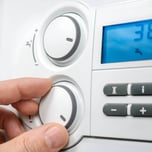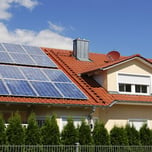Answer these simple questions and we will find you the BEST prices
Which type of solar quotes do you need?
It only takes 30 seconds
100% free with no obligation

Get up to 3 quotes by filling in only 1 quick form

Slash your energy bills by installing an energy efficient boiler

We’ve helped over 500,000 homeowners reduce their carbon footprint
- GreenMatch
- Boilers
- Boiler Comparison
- types
- Electric vs Gas Boiler
Electric Boiler vs Gas Boiler: Which is Better?

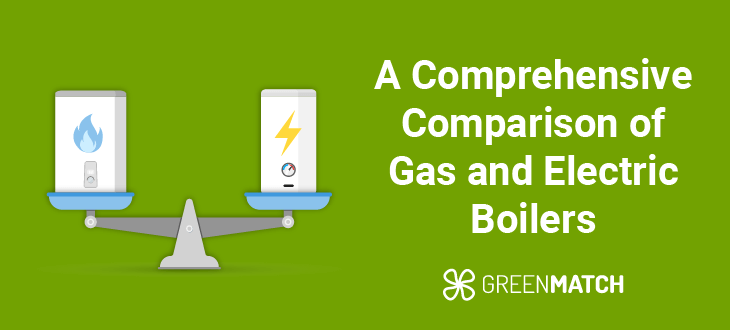
- Electric boilers are more energy efficient than gas boilers as they deliver more usable heat and achieve 99–100% efficiency.
- Electric boilers are considered safer than gas boilers because they don't emit carbon dioxide as a byproduct of burning combustible fuel.
- Gas boilers are the most cost-effective, with annual running costs of £890 as compared to £1,700 for electric boilers.
As of 2026, around 15% of UK households are off the mains gas grid and rely on alternative heating sources, like electric boilers. Yet, while being environmentally friendly and incredibly efficient, their high running costs are a major offputting factor for most homeowners.
Gas boilers, in turn, are historically more popular because of their affordability and reliability but face uncertainty due to the UK's changing gas boiler ban plans. If enforced, the transition away from fossil fuels will become necessary, posing the question of how homeowners can balance the cost, efficiency and environmental impact of their heating systems.
This article examines the electric boiler vs gas boiler competition through the lenses of their efficiency, sustainability, and economic viability to help you make the most informed decision. However, deciding on an electric or gas boiler depends on your circumstances and home specifics, which is challenging without professional help. But finding a trustworthy installer on your own takes days or weeks – the time a busy homeowner does not always have.
We can provide you with up to 3 quotes from boiler installers we have thoroughly checked and vetted, so you don't have to. Simply fill in our 30-second form below, and within 48 hours, we'll connect you with heating experts near you.
Our service is free and non-binding, click below to begin.
- Quotes from local engineers
- Payment by finance available
- Save up to £975
It only takes 30 seconds



Electric vs gas boiler: The key differences
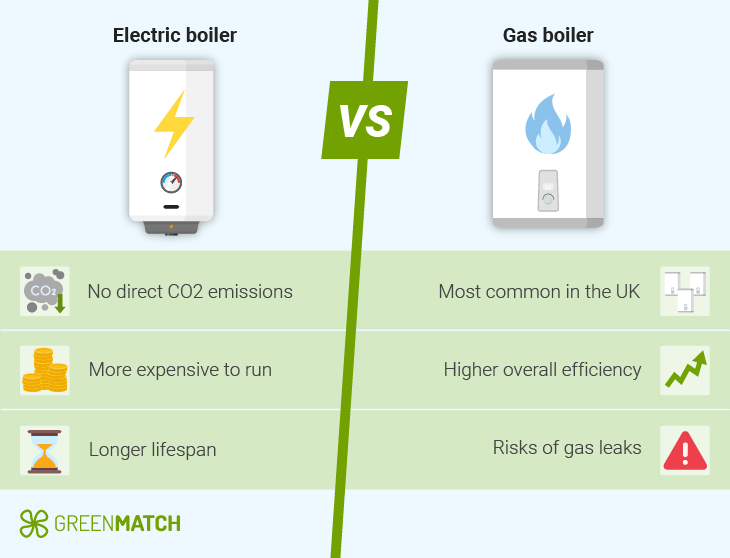
The biggest (and most evident) difference between these boilers is their fuel source. Electric boilers use electricity to generate heat, while gas boilers burn combustible natural gas to produce high temperatures.
When comparing electric boilers to gas boilers, homeowners should factor in their heating demands, property size, budget and sustainability choices. Let's take a look at what sets electric boilers apart from gas boilers in the following categories:
- Costs: Electric boiler and gas boiler running costs can diverge greatly. As of April 2026, the energy price cap for electricity is 27p/kWh as opposed to 7p/kWh for gas.
- Efficiency and performance: Electric boilers achieve an efficiency rating of up to 100% at the point of use, while gas boilers usually reach 90-95%. For more context, please refer to the “Gas boiler vs electric boiler efficiency” section below.
- Environmental impact: The near-perfect efficiency of electric boilers allows for zero direct emissions during operation. However, their sustainability is doubtful if the electricity is generated from fossil fuels. Gas boilers release direct carbon emissions as a byproduct when burning natural gas during operation.
- Maintenance and lifespan: The interior arrangement of gas boilers is more complex and has more moving parts than electric boilers. This means gas boilers are more prone to breakdowns and shorter lifespans and require annual servicing and checks.
- Safety considerations: In a situation of breaks, irregular maintenance, and poor ventilation, gas boilers pose a risk of carbon monoxide poisoning, so electric boilers are considered safer to operate in this regard.
- Installation requirements: Gas boilers, unlike electric, require a flue connection and gas supply. Electric boilers, however, only require a mains power supply as they rely on the grid.
It’s important to understand what reliance on the grid means exactly. Occasional supply cuts undoubtedly disrupt electric or gas boiler functioning. But what should be commonly understood by the electrical boilers’ reliance on the grid refers to the general state of the UK’s electrical grid infrastructure.
The UK’s electricity grid is ageing, with much of the infrastructure dating back to the 1950s-60s and many substations nearing the end of their operational life. Moreover, the grid was initially designed for the one-way power flow (from large power plants to consumers), while modern renewable energy sources require bi-directional flow (from consumers back to the grid).
Apart from that, grid modernisation and expansion are moving slowly, and this poses greater challenges for rural areas, which typically have a weaker capacity to handle additional loads, unlike urban areas. That’s why electric boilers sometimes can’t be used with solar panels or require upgrades to the local grid infrastructure before installation.
Electric boiler vs gas boiler running costs
Gas boilers are cheaper to run than electric boilers. Running an A-rated gas boiler varies between £620 and £1,260 per year, while it's around £1,700 for electric boilers for an average 2-bedroom home.
When considering electric vs gas boiler running costs, factors like current fuel prices, maintenance costs, usage patterns and property size play a paramount role.
| Metric | Electric boiler | Gas boiler |
|---|---|---|
| Cost per kWh* | 27.03p | 6.99p |
| Annual running cost** | £1,700 | £890 |
| Monthly cost** | £286 | £75 |
| Maintenance cost | No annual servicing | £60–£110/year |
**Running cost calculated based on current energy rates and average annual heating demand (11,212.5 kWh) for a 2-bedroom house with an A-rated boiler.
Due to the high prices of electricity, electric boiler running costs can be cut by pairing with solar panels or using off-peak tariffs, such as Economy 7 (£0.17/kWh).
You could also take advantage of renewable energy grants like the ECO4 or Boiler Upgrade Scheme (BUS). The latter offers £5,000 towards the installation of a biomass boiler and £7,500 to replace a boiler with a heat pump.
Gas boiler vs electric boiler efficiency
| Factor | Gas boilers | Electric boilers |
|---|---|---|
| Energy source journey | Natural gas is piped directly to homes | Electricity requires conversion from fossil fuel into power, then transmission to homes via the grid network |
| Generation efficiency | 90-95% | 30-50% |
| Transmission losses | 1-2% (gas pipelines losses) | 7-12% (electricity grid losses) |
| Carbon intensity | 0.216 kg CO₂/kWh | 0.519 kg CO₂/kWh |
| Fuel factor penalty* | 1.00 (baseline) | 1.55 |
| Point-of-use efficiency | (90–95%) | (99–100%) |
| Overall systemic efficiency | A (80–90%) | D (30–45%) |
Electric boilers are considered 99-100% efficient at the point of use, which means they convert almost all electricity directly into heat when they are operating. Yet considering the whole electricity supply chain including its generation, transmission, and distribution, electric boilers score low ErP ratings (Energy-related Products), usually around D.
Such efficiency paradox occurs due to several factors:
-
Electricity generation: Fossil fuel plants (coal or gas-fired) achieve only between 30-50% efficiency when generating electricity. This is because up to 50-70% of the original energy is lost as heat during this stage. In comparison, gas is naturally occurring and retains 90-95% efficiency when it’s piped into homes.
-
Transmission and distribution: While the generated electricity makes its way to substations, it faces another 2-5% losses due to resistance in high-voltage lines. When it reaches homes through distribution lines, another 5-10% of the energy is lost due to resistance in cables and transformers.
-
Grid carbon intensity: In the UK, grid electricity emits ~0.519 kg CO₂/kWh—more than double natural gas at 0.216 kg CO₂/kWh. Thus, despite the fact that electric boilers provide low-carbon heating at home, their indirect emissions increase their overall environmental efficiency.
- Fuel factor: When considering the full energy supply chain, electricity gets a fuel factor of 1.55, which is higher than gas (1.00).
As a result of these losses, only 30-45% of fossil fuel energy becomes electricity, resulting in lower overall systemic efficiency.
On the other hand, modern condensing boilers reach 90-95% efficiency at the point of use. However, their overall efficiency is rated as 80-90% (while electric boilers have 30-45%). This is because gas boilers' supply chain is less complicated and doesn't involve power plants and long-distance wires.
During natural gas extraction and processing, only 5-10% of the original energy is lost, and another 1-2% is lost during distribution. Another 5-10% is wasted through flue gases at the point of operation.
Gas and electric boiler installation costs
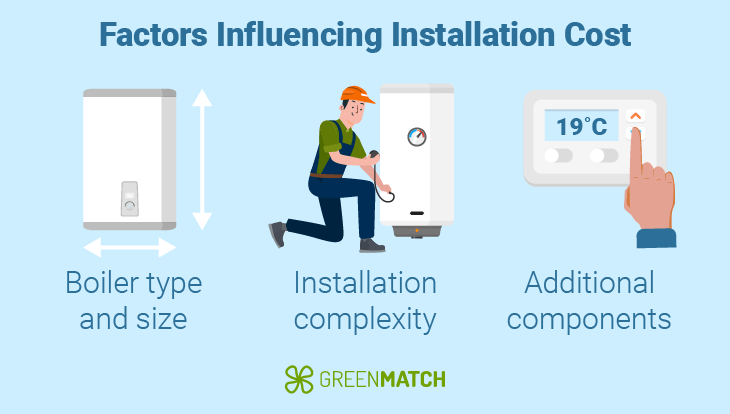
On average, installing a gas combi boiler costs around £3,800 and £3,250 for an electric unit. This includes the price of a new boiler, labour costs (£300–£500 per day), and additional elements. The installation time for gas boilers is 1-2 days while installing an electric boiler can be done within 1 day.
| Boiler type | Supply cost | Cost inc. installtion | Average price inc. installation |
|---|---|---|---|
| Gas | £600 - £3,300 | £1,600–£5,300 | £3,800 |
| Electric | £500 - £3,000 | £1,500 - £5,000 | £3,250 |
The installation total depends on the following factors:
Boiler type and size: Gas combi boilers are the most common boilers installed in the UK as they provide heating and hot water from one unit. For larger properties, a system or regular boiler might be a more appropriate choice, but they come with separate water storage units, which increases the supply and installation cost. The average cost to install a regular boiler or a system boiler is £3,550 and £3,300, respectively.
Electric boilers exist in similar configurations; however, they aren't available in high output sizes due to electrical supply limitations. For example, electric boiler outputs above 15kW require a 400V (three-phase) power supply, while the common one at residential properties is 230V (single-phase). This means installing such boilers calls for substantial electrical upgrades (£3,000–£8,000 for a three-phase circuit switch), which is not cost-effective in the long term considering the running costs of an electric boiler compared to a gas boiler of any type.
Installation complexity: Gas boilers must be installed by a Gas Safe registered engineer, and the actual process requires flue (£200–£700) or condensate pipes (£90–£130) installation and gas line checks (£250–£400), which pose additional costs.
Electric boilers, on the other hand, don't need flue or gas line adjustments. However, the majority of properties require dedicated high-amperage circuits to handle the electrical load. In the cases of high-output boilers, a three-phase power supply is needed, which is not typical in residential properties and is expensive to install.
- Additional components: Magnetic filters could be installed to prevent boiler wear and tear, which would cost you between £100 and £300. A smart thermostat (£150–£280) is another upgrade that can improve the overall heating efficiency and potentially save on your energy bills.
It's crucial to remember that these costs are just approximate and might differ for your particular heating needs. Therefore, consulting a Gas Safe or Competent Person Scheme registered installer is necessary to understand the actual cost of a new boiler for your home.
However, finding a qualified engineer in your area on your own can take hours of research and still leave you with no installer contacts at your fingertips.
GreenMatch can do the legwork for you and offer up to 3 quotes from our installer network. All you need to do is complete our 30-second form below and compare the quotes you will receive within 48 hours.
Our service is free and non-binding; click below to begin.
- Quotes from local engineers
- Payment by finance available
- Save up to £975
It only takes 30 seconds



Advantages & disadvantages of gas and electric boilers
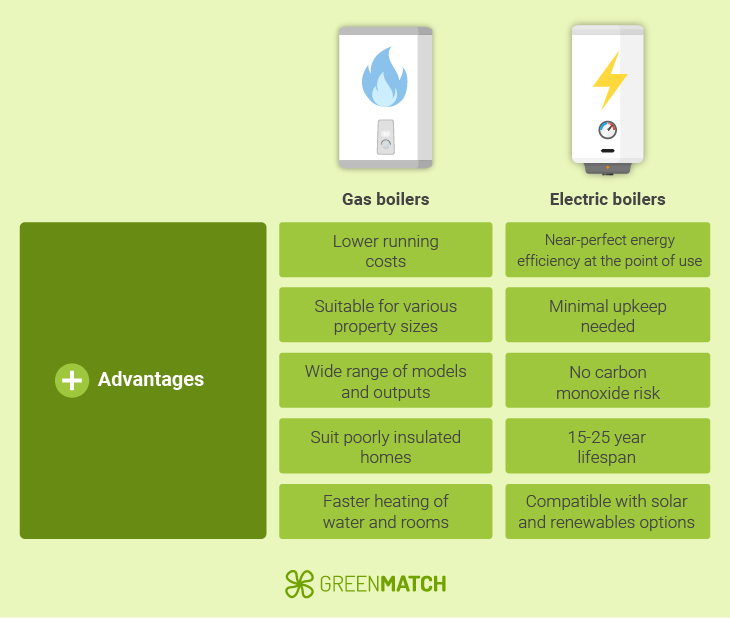
Currently, 78% of UK homes use gas as the main fuel for gas heating. There's a reason for that – it is the cheapest fuel to heat your home and, therefore, brings the lowest running costs.
As a response to such high demand and to cater to various home sizes and heating demands. Gas boilers are currently represented within outputs of 11kW – 40kW, making them the best boilers for a large house.
Electric boilers, in turn, boast a 15-25 year lifespan compared to 10-15 years for gas boilers, thanks to their simpler build. They pose no carbon monoxide leak risks as they operate directly from the grid and don't burn any fuel.
Electric boilers can potentially be paired with solar panel systems and heat pumps to reduce running costs and decrease reliance on the grid, but whether it's possible for your particular home should be thoroughly discussed with a certified installer.
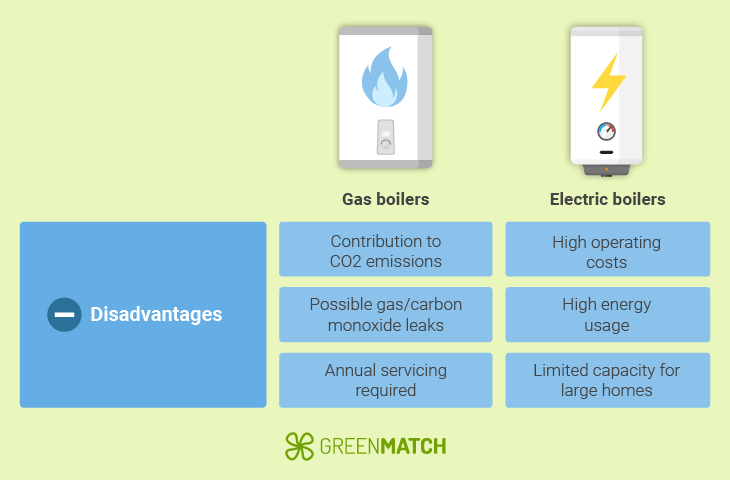
Gas boilers emit 0.215 kg of carbon dioxide per kWh, which makes up 14% of the UK's carbon emissions. Moreover, possible carbon monoxide gas leaks are a more concerning factor to consider when comparing the drawbacks of gas vs electric boilers.
Carbon monoxide (CO) is a colourless, odourless gas produced when there’s not enough oxygen for complete combustion due to an inadequate air-to-fuel ratio and poor ventilation. Incomplete combustion can also occur when the flame contacts cold surfaces in the boiler, causing rapid cooling. This disrupts the combustion process, prevents the fuel from burning completely, and produces CO.
In case you smell gas, this might be a sign of a gas leak. Call the Gas Emergency Service on 0800 111 999.
Since CO can't be detected by smell, only annual inspections by a certified boiler installer can prevent any boiler faults leading to CO production. This servicing step is described as a gas boiler disadvantage, as it can feel like an extra visitor to your wallet. However, it's a crucial measure to take for your home and family's safety.
It's fair to note that electric boilers also need to have the heating elements inspected yearly, as calcification and oxidisation can affect the boiler's efficiency.
Also, the running costs of electric boilers, in turn, increase heating bills significantly due to the higher cost of electricity in the UK. High running costs and low maximum outputs (15kW or less as opposed to 20-40kW for gas boilers) make heating larger properties with an electric boiler problematic.
On top of that, electric boilers consume a significant amount of a home's electrical capacity. For example, a typical 10kW electric boiler uses about 45 amps which is almost half of a standard 100-amp household fuse. This high usage limits the simultaneous use of high-power appliances such as washing machines or tumble dryers.
Which is best for your situation?
Both electric and gas boilers do great at heating your home. However, when it comes to their effectiveness, you should carefully consider all electric vs gas boiler pros and cons based on your heating and hot water demand and your specific requirements.
Gas boilers are generally more powerful than electric boilers. Thus, they can better meet greater demands for heating and hot water. This is especially relevant for large homes with 5 or more bedrooms and multiple bathrooms. Though, every time your gas boiler fires up, it releases CO2 into the atmosphere.
Electric boilers do not cause carbon emissions if the energy powering them comes from renewable sources. They are also more efficient, so you won't waste as much energy as you would with a gas boiler. However, electric boilers’ output range is generally too low to meet the demands of a house with several radiators and more than 1 bathroom.
Changing from a gas boiler to an electric one is a good idea and a greener alternative as long as it can fit your home’s needs and runs on green or alternative energy sources, such as solar panel or wind-generated electricity.
If you're still on the fence about which boiler to opt for, talking to an experienced boiler installer who can advise on the best electric boilers or highly efficient condensing gas boilers is recommended. However, how long does it take to find an installer you can trust? You can spend hours (or even days) calling up installers and comparing their rates, and then find out they're booked months in advance.
Luckily, we can speed things up for you by connecting you with up to 3 boiler installers near you within 48 hours. Simply fill out our short questionnaire about your home and compare the quotes you receive.
Click below to get started.
- Quotes from local engineers
- Payment by finance available
- Save up to £975
It only takes 30 seconds



FAQ
As gas boilers tend to be more powerful than electric boilers, they are generally a better option for large houses. Electric boilers, on the other hand, are safer, easier to maintain, and very effective at meeting the central heating and hot water demand of small homes and flats.
Electric boilers’ 99-100% efficiency is much higher than the 90-94% efficiency that most highly-efficient condensing gas boilers feature.
Gas boilers’ running costs are lower than electric boilers’ running costs across the UK. This is because of the high prices of electricity in the country.
It depends on your house’s central heating and hot water demand and your specific needs. If you own a large house, then you should not replace your gas boiler with an electric one, as these are generally less powerful and can’t meet large demands. It’s advisable to consult a professional installer to find the best option for you.
We strive to connect our customers with the right product and supplier. Would you like to be part of GreenMatch?

- Quotes from local engineers
- Payment by finance available
- Save up to £975
It only takes 30 seconds






